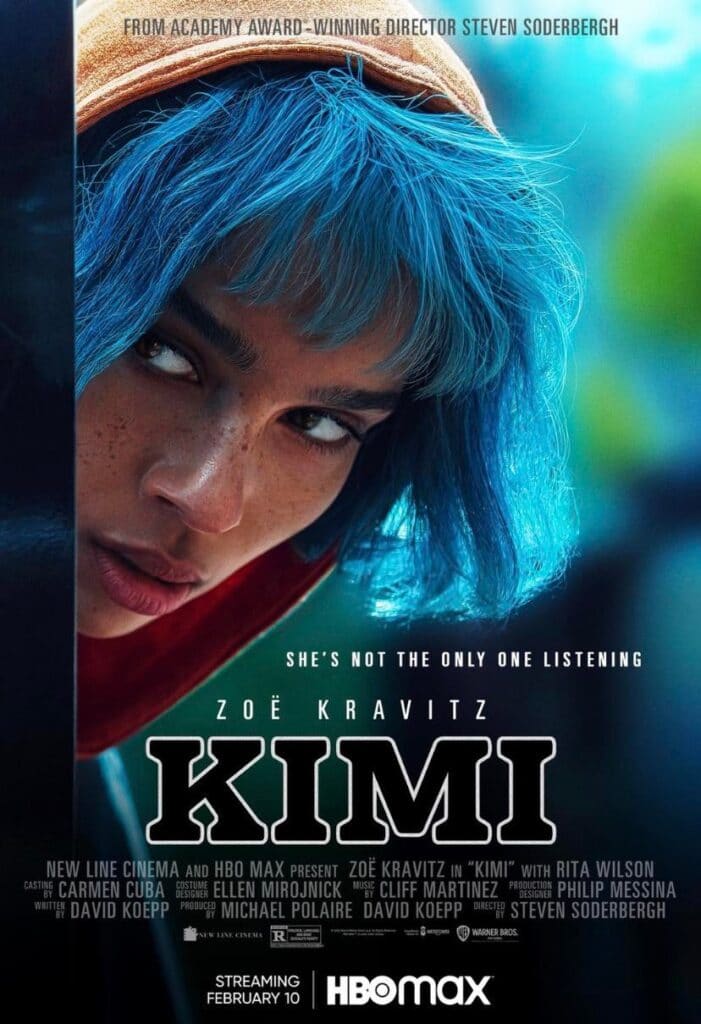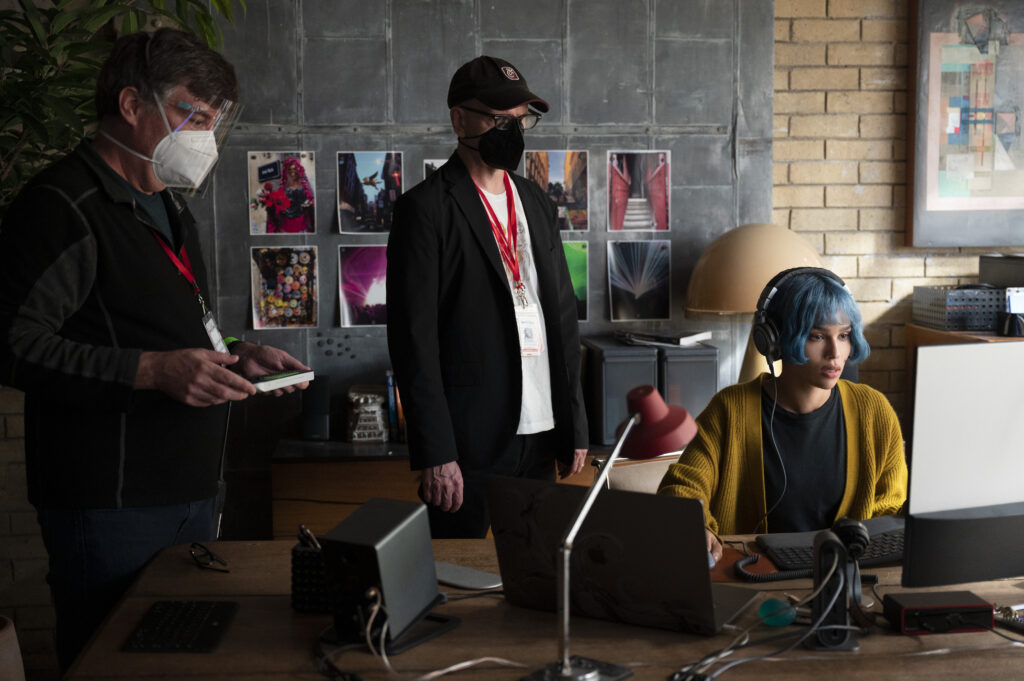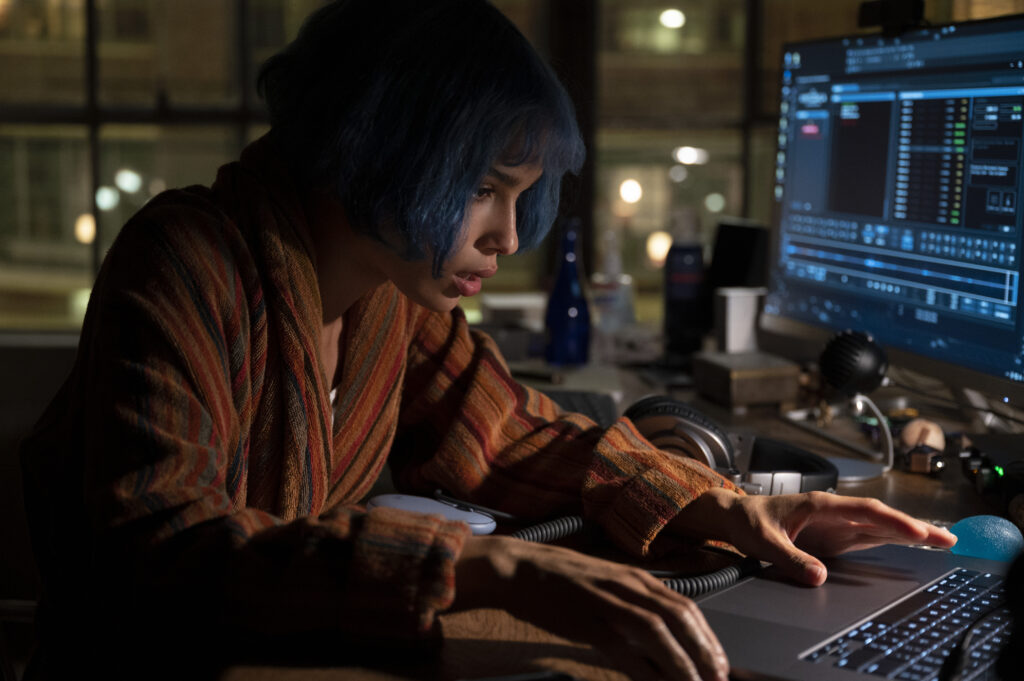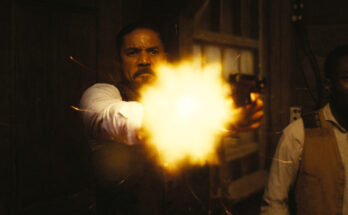Want to hear more from the actors and creators of your favorite shows and films? Subscribe to The Cinema Spot on YouTube for all of our upcoming interviews!
Managing editor & film and television critic with a Bachelor's of Arts in English Literature with a Writing Minor from the University of Guam. Currently in graduate school completing a Master's in English Literature.
Kimi is written by David Koepp (Jurassic Park, Mission: Impossible, Panic Room, Zathura: A Space Adventure) and directed by Steven Soderbergh (Erin Brockovich, Ocean’s Eleven, Contagion, Magic Mike, Logan Lucky, Unsane, No Sudden Move).
In this review, I will be discussing HBO Max’s newest film release, Kimi. There will be no spoilers here, as the title of this article suggests. Nonetheless, please read ahead at your own discretion to avoid any possible revelations.

Plot Summary
According to WarnerMedia, here is a synopsis for Kimi.
New Line Cinema and HBO Max present Academy Award-winning director Steven Soderbergh’s original thriller KIMI, starring Zoë Kravitz.
Angela Childs (Kravitz) is a tech analyst who reviews data streams for the Amygdala Corporation, purveyor of the voice-activated companion server KIMI. Amidst a pandemic, even though restrictions have eased, Angela suffers from agoraphobia and follows a strict routine within the safety of her loft apartment in downtown Seattle. Between computer breaks, Angela flirts—among other things—with her neighbor across the street, and communicates with her mother, her dentist, and her therapist via video chat, proving she never needs to leave the comforts of home.
But that changes when she hears something horrific in one of the streams she is analyzing. Reporting it over email is deemed too risky, so a trusted co-worker advises Angela to go to their head office downtown and speak directly to executive Natalie Chowdhury and alert her to what Angela is certain is a serious crime. But Angela hasn’t ventured outside since before the pandemic. Just getting to the office is a huge challenge, but she’s determined to do the right thing. But Angela has no idea what will actually happen when—and if—she’s able to step out of her comfort zone.
WarnerMedia
Discussion
At one hour and twenty-nine minutes, Steven Soderbergh’s Kimi is a unique independent drama thriller that isn’t so much “in your face” about the ongoing Coronavirus pandemic. The filmmaker’s signature is evident and present throughout the film: a fast-paced narrative with themes on personal identities and the human condition. Kimi examines digital technology, psychology, and pandemic situations, much like Soderbergh’s previous works.
The entire production of the film is astonishing. The music and sound, the cinematography, the set decoration, the make-up, hair, and costumes offer us something that is audibly and visually appealing for moviegoers and film buffs such as myself. Kimi appears simple and austere, yet there is so much behind it that is actually complex as parts of the overall narrative.
While his 2011 film, Contagion focused on the viral pandemic aspect of the 21st century, the current film’s Kimi device mirrors actual inventions and inventions made in the past decade or so — Siri, Alexa, etc. It is an obvious critique of FAAMG/FAANG (Facebook, Apple, Amazon, Microsoft/ Netflix, Google), the reigning tech companies that collect personal information and data for companies to use to their advantage. They comprise what Italian sociologist Maurizio Lazzarato refers to in Signs and Machines: Capitalism and the Production of Subjectivity as the mega-machine that makes use of marketing apparatuses. These large assemblages “gather, select, and sell millions of data” based on our behavior, preferences, actions, and decisions made on the devices and their streaming services.
Now, you can see why Soderbergh would want to make a film of this nature.
Allusions to the Classics
I noticed that Soderbergh adopts and adapts Hitchcock’s storytelling style, specifically with Rear Window (1954) and Vertigo (1958). The protagonist spends half to most of the film’s runtime at home. In a few scenes, Childs (Kravitz) looks out the window and observes people living their lives — those walking on the street and neighbors in the apartment complex across from hers. She gains nothing from this except wonder, so we cannot really argue that this activity of hers would be considered voyeuristic.
While the protagonist in Vertigo has a fear of heights and must conquer it by… being above ground, Kravitz’s character has a fear of stepping out of her apartment into open space. This results from the COVID pandemic itself, something to which I indubitably believe many other people can empathize. The way Childs conquers her agoraphobia is a similar sense of duty to Hitchcock’s character. Childs eventually finds herself surrounded by local protestors who are fighting for some cause despite being susceptible to whatever may be preventing them from going out. Risks like this are similar to the Black Lives Matter protest events of 2020.
Kimi also pays homage to John Hughes’s Home Alone in an ever-so-subtle manner. Aside from Buzz McCallister actor Devin Ratray playing a crucial role with an interesting name, Steven Soderbergh turns Kravitz into a female, adult, and more intelligent version of Kevin McCallister. The film doesn’t make use of complex contraptions but instead focuses mainly on the Kimi device to do its job. Childs possesses the same amount of courage and curiosity as Kevin had ages ago, so it feels nice to see something like this in a movie happen again.

The Crew of Kimi
Peter Andrews serves as Kimi‘s director of photography. Mary Ann Bernard is the editor, while Corey Bayes — also the film’s co-producer — serves as the associate editor. Cliff Martinez is in charge of the music, while Season Kent serves as the music supervisor. Randy Miller is the musical score conductor & orchestrator, while Mark Jan Wlodarkiewicz serves as the music editor. Larry Blake is the sound designer.
Carmen Cuba serves as the film’s casting director; Judith Sunga is the casting associate, with Corey Pinchoff as the casting assistant. Rich King is also the casting director for the extras.
Philip Messina serves as the production designer. Robb Earnest is the production supervisor, while Victor Zolfo serves as the set decorator. Miho Suzuki and Leslie D. Bennett are the heads of the make-up and hair departments, respectively. Bruce Jones is the supervisor on the visual effects. Michael Manson serves as the art director and is assisted by Victor Capoccia. Michelle Miller is the key make-up artist, while Pavy Olivarez is the assistant to the hair department head.
Ellen Mirojnick is the costume designer for the film. Jaclyn Tamizato serves as the costume supervisor, while Sabrina Calley serves as the assistant costume designer. Costumers include C.C. Cravedi, Trish Yoo, Josh Mar, Shay O’Grady, and Jessica Peel-Scott. Set dressers include Corey Gomez, Miguel Lequericabeascoa, Victor Mendez, Eric Pierson, Billy Sender, and Shaun Young.
Stunts
R.A. Rondell serves as the stunt coordinator of Kimi.
The stunt actors consist of Cassie Jo Craig, Derek Graf, Alvin Zalamea, Gee Alexander, Michelle Damis, Tommy Daniels, Rachel Gelfeld, Karleena Gore, Kate Gray, Michael Hilow, Bret Kiene, Jeff McKracken, Doug O’Dell, Brady Romberg, James A. Smith, Alex Terzieff, Jeff Winn, and Nico Woulard.
The Cast of Kimi
Zoë Kravitz portrays the protagonist, Angela Childs, while Betsy Brantley voices Kimi. Byron Bowers plays Childs’s love interest, Terry Hughes, while Devin Ratray plays a neighbor who resides in Hughes’s building. Robin Givens plays Childs’s mother.
Derek DelGaudio plays Bradley Hasling, the CEO of The Amygdala Corporation. India de Beaufort plays Sharon. Sarai Koo plays Hasling’s wife, Jessica, while Koya Harada plays their son.
Alex Dobrenko portrays Darius Popescu, Childs’s online colleague in Romania. Andy Daly plays Christian Holloway, Childs’s superior; while Noelle E. Parker and Finnegan George play his tween children. David Wain plays Childs’s dentist, while Emily Kuroda plays Dr. Sarah Burns, Childs’s psychiatrist.
Rita Wilson appears as Natalie Chowdhury, while Jamie Baer plays the character’s assistant. Alina Gatti voices the Amygdala building intercom, while Caleb Emery plays a tech hub worker.
Erika Christensen portrays Samantha Gerrity, a woman whose stream Childs investigates. Beka Sikharulidze plays Yuri, a computer hacker; while Jaime Camil plays Antonio Rivas, Amygdala’s hired hitman. Charles Halford portrays a tall thug, while Jacob Vargas portrays a glasses thug.
George, Sheilla, Sebastian, and Henrich Evans play a family in Childs’s neighboring building. Fox 13 Seattle news anchors Alyana Gomez and Brian Flores appear in the film. Lakin Valdez plays Marcos, the upstairs neighbor. Patrika Darbo, Cheyenne Nguyen, and Andrew Daymer voice as a southern woman, a teenage girl, and a young boy, respectively.
Aviona Rodriguez Brown, Erica Matthews, and Megan Gotz play “boisterous women”. Raymond Power and Brenna Wagner appear as a guy in a suit and a blonde woman, respectively. Conner Marx and Lauryn Scoon play a man with an umbrella and a girl at a burrito truck, respectively.
Kravtiz in Kimi: The Protagonist’s Performance and Character Development
Starring in a film less than a month before Matt Reeves’s The Batman, Zoë Kravitz proves to be a force to be reckoned with. I have not seen her perform this way since 2011’s X-Men: First Class or, more recently, 2017/18’s Gemini.
Angela Childs has a lot of psychological baggage to carry along with her, and I don’t blame his woman; times are tough! Koepp writes the character and her environment so excellently with as much detail as possible that it feels as if the film somewhat follows in the same vein as the screenwriter’s previous work, Panic Room.
Soderbergh and Koepp give the protagonist a kind of ecosophical milieu that is easy to follow once you know and understand what she’s dealing with. By looking at her mental/personal, social/professional, and environmental ecologies, we get a full picture of what is of concern. To say that the character is highly germaphobic is wrong. In fact, it is not necessarily the case. Childs does possess knowledge and wisdom but at times lack the guts and willpower to move out of one place. It is not until after the halfway point that we see her finally confront the internal and external conflicts and obstacles that keep her from escaping her stagnant state.
If Kravitz can do fine here, then I cannot wait to see her take on more lead roles in film and television.

Final Thoughts on Kimi
Steven Soderbergh’s Kimi is a film worth watching to get us through the day while simultaneously striving in a new era of living. I personally hope this could be Warner Brothers’ version of Home Alone. If that’s the case, then I can imagine a sequel would be interesting to see. While the film already wraps things up, I would love to see more from Kravitz’s character and how she deals with the corporation, unless, however, that is the end of that. Unlike other motion picture works made since March 2020, it does not make the pandemic out to be such a huge thing; rather, it still exists and the after-effects of it are present all around us. Moreover, Soderbergh and Koepp present the audience with the consequences of allowing something viral and life-threatening to remain normalized in our everyday lives. Maybe it is technology, or maybe it is the plague.
One thing is for sure, and it’s the most frightening part of all: something has made its stay, and it isn’t going anywhere any time soon. The solution is simple yet risky; it is incumbent upon all of us to do the right and just thing despite the predicaments that prevent us from aiming to do just that. This film may not appear as intense as Contagion, but I assure you that the stakes are there.
Steven Soderbergh’s Kimi streams on HBO Max starting this week!
Will be you watching this film? If so, let us know! For more crime, drama, and thriller-related news and reviews visit and follow The Cinema Spot on Facebook, Twitter, and Instagram!
Managing editor & film and television critic with a Bachelor's of Arts in English Literature with a Writing Minor from the University of Guam. Currently in graduate school completing a Master's in English Literature.





16 Comments on “Steven Soderbergh’s ‘KIMI’ (HBO Max) Non-Spoiler Review – Texts, Spies, And Audiotape”